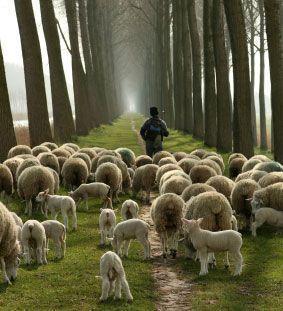The strange thing about sheep is that it is almost impossible for them to lie down unless four requirements are met. To be at rest there must be a definite sense of freedom from fear, tension, aggravation and hunger. A flock that is restless, discontented, always agitated and disturbed never does well.
I didn't realize sheep are so timid and easily panicked. Even a stray jackrabbit suddenly bouncing from behind a bush can stampede a whole flock. When one startled sheep runs in fright a dozen others will bolt in blind fear, not waiting to see what frightened them.
There is also constant conflict and jealousy within the flock - the "butting" order. The more aggressive sheep will maintain their positions of prestige by butting and driving other ewes and lambs away from the best grazing. All the sheep maintain their exact position within the flock by using the same tactics of butting and thrusting at those below and around them.
One point that always interested me very much what that whenever I came into view and my presence attracted their attention, the sheep quickly forgot their foolish rivalries and stopped their fighting. The shepherd's presence made all the difference in their behavior. My presence put an end to all rivalry. - Phillip Keller, Shepherd
The same is true of people.
In our human relationships, when we become aware of being in the presence of Christ, our foolish, selfish snobbery and rivalry ends. It is the humble heart walking quietly and contentedly in the companionship of Christ that we relax - simply being glad to rest and let the world go by.
He makes me lie down in green pastures.
When our eyes are on our Master they are not on those around us. It's good to remind ourselves that in the end it is He who will decide and judge what our status really is. After all, it is His estimation of me that really matters. Any human measurement is bound to be pretty unpredictable, unreliable and far from final.
Not only does a good shepherd remove the fear, the tension, the aggravation and hunger, but he also provides the green pasture. In Palestine where David wrote Psalm 23, green pastures didn't just happen. Green pastures were the result of clearing rough, rocky land - tearing out brush and roots and stumps. Deep plowing and careful soil preparation was needed, seeding and planting special grains and legumes and irrigating with water.
Lots of work. He really cares.
He clears the rocks of stoney unbelief. He tears out the roots of bitterness. Like clay, He breaks up the hard, proud human heart. Then, He sows the seed of his Word and waters it with the dew and rain of His presence by the Holy Spirit. He tends and cares and cultivates the life, longing to see it become rich and green and productive. These are the efforts of a Shepherd who wants to see His sheep satisfied and well fed. His concern for our care is beyond our comprehension. All we can do is lie down and enjoy it.


